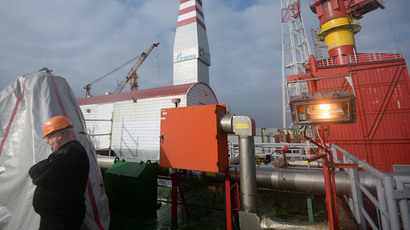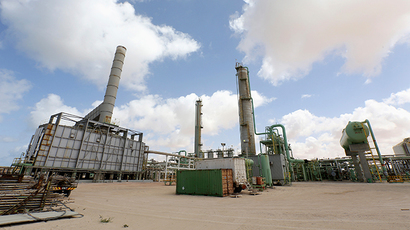OPEC decision will keep oil prices low & hit Russia, Iran, US – experts

Russian officials and experts warned that oil prices will remain below $80 per barrel for some time, after OPEC’s decision not to cut output. It will hurt the economies of Russia, Iran, and Venezuela – and deal a blow to shale oil production in the US.
OPEC announced on Thursday that it will not be changing production levels, leaving the daily output ceiling at 30 million barrels despite oversupply concerns and soft oil prices.
READ MORE: Oil slumps 4% as OPEC leaves output unchanged
Impact on Russia’s budget
Following the meeting, Russian Minister of Finance Anton Siluanov said that Moscow needs to review its state budget under the conditions that oil prices are likely to remain at around $80 per barrel, and not $100 per barrel, for the next few years, RIA Novosti reported.
“We need to build our fiscal and economic plans on the basis of new macroeconomic conditions, which in our opinion are not going to change quickly,” Siluanov said.
The plunge in oil prices following the OPEC decision confirmed the ministry’s outlook that Russia’s budget must be calibrated according to the lower oil prices, the head of the Russian Finance Ministry’s strategic planning department, Maksim Oreshkin, said.
“This situation once again confirms our position that Russian budget projections need to be adopted to new oil prices, which could remain [at a substantially lower level] for a long time,” he said, adding that this means a tougher approach to public spending and possible optimization.

Oil could even fall below $70 per barrel, which may negatively impact Russia since the ruble is closely connected to oil prices, market analyst at Alpari, Anna Kokoreva, told Rosbalt.ru.
“Oil prices have all the chances of falling below $70 per barrel in the near future. It is a bad sign for the Russian economy. A further drop will trigger a new wave of ruble devaluation and lead to a stagnation of oil production in the country,” she said. “In turn, the drop in national currency will accelerate inflation and the Ministry of Finance’s forecasts of two-digit values could become a reality.”
Meanwhile, a representative from Russian state-owned oil company Rosneft told TASS that the “current market situation does not require unexpected actions,” noting that “nothing extraordinary is happening.”
He explained that Rosneft has a sufficient margin of safety, since its production costs are one of the lowest in the world – just above $4 per barrel.
Hurting Iran, Venezuela, Ecuador...and US
Kokoreva pointed out that Venezuela, Ecuador, and Iran will suffer significant losses, as all three of the countries’ budgets depend significantly on oil revenues.
More specifically, countries like Venezuela and Iran will not be able to sustain their social programs run by the government if oil prices experience a sharp drop, partner at RusEnergy Mikhail Krutikhin told Russkaya Planeta.
“Iran and Venezuela are panicking due to the fall in oil prices and are trying to keep them up through any means possible. Their social programs will not withstand the low fuel prices,” Krutikhin said.
He added that Venezuela needs oil prices to be at $150 per barrel in order to balance its budget, while Iran needs $140.

Another loser in the situation is the US, since its own shale boom could be curbed by low prices. The payoff from shale decreases with every dollar knocked off the barrel price.
Meanwhile, the only clear victor, according to analysts, is Saudi Arabia, which can still make a profit even with lower prices.
“The winner of this game is Saudi Arabia, which is gradually moving towards its main goal – to oust the US shale oil from the market, make production of oil sands for the US not worth its while, and strengthen its own position. If shale projects stop in America, Saudi Arabia’s share of the market will begin to grow again,” Kokoreva said.
Playing politics is a big part of OPEC, and US shale success is a problem for Gulf-producing nations, the executive director of DV Advisors, Patrick Young, told RT.
“There are all sorts of politics involved. OPEC never misses a trick to play politics,” Young said. “There is an issue with America. The problem with America is that it is producing more and more oil at the moment and actually if OPEC as a cartel simply cut the amount of oil it produces, American shale would fill the gap.”
A Russian oil tycoon also warned that OPEC’s decision is a strike against the American market, which becomes unprofitable at $70-80 per barrel.
“In 2016, when OPEC completes this objective of cleaning up the American marginal market, the oil price will start growing again,” Leonid Fedun, a board member of Lukoil, Russia’s largest private oil company, told Bloomberg News.
Following OPEC’s decision, Brent Crude plunged, falling more than $3 to below $75 per barrel, while crude dropped over 4 percent to $71 per barrel.
Overall, oil prices have fallen more than $40 per barrel since mid-June, when oil peaked at $115. Low prices have been triggered by oversupply created by increased US production and waning global demand.
The next OPEC meeting will be held in June 2015.














